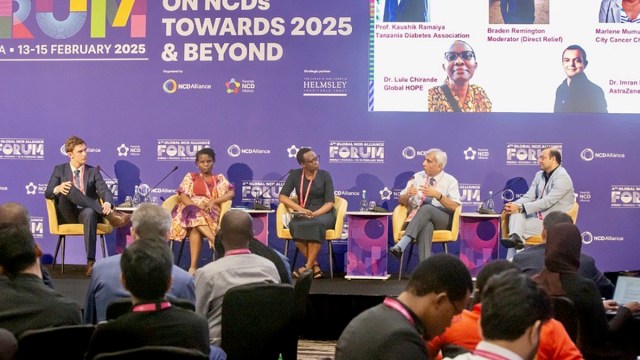Health
2025-04-08 10:01:00
Content

Global Health Summit Tackles Rising Tide of Chronic Diseases
In a powerful demonstration of international collaboration, nearly 800 health experts from 66 countries converged in Kigali, Rwanda, for the Fourth Annual Non-Communicable Disease Alliance Forum. The gathering highlighted a critical global health challenge: the alarming projected rise of chronic diseases by 2030.
The conference brought together leading medical professionals, policymakers, and researchers to confront a pressing health crisis that threatens to reshape global healthcare landscapes. Non-communicable diseases (NCDs), including conditions like heart disease, diabetes, cancer, and chronic respiratory illnesses, are rapidly becoming a worldwide epidemic.
Delegates shared groundbreaking research, innovative prevention strategies, and collaborative approaches to combat these silent but devastating health challenges. The forum underscored the urgent need for comprehensive global health strategies that can mitigate the growing impact of chronic diseases across diverse populations and regions.
As nations grapple with the complex interplay of lifestyle, environmental, and genetic factors driving NCD prevalence, this summit represents a critical step towards developing coordinated, proactive health interventions that can protect future generations.
Global Health Crisis: The Silent Epidemic of Chronic Diseases Threatening Humanity
In an unprecedented global gathering that signals a critical turning point for international health policy, world leaders and medical experts converged to confront one of the most pressing challenges of our time: the escalating threat of non-communicable diseases that are silently reshaping the global health landscape.
Unmasking the Global Health Challenge That Demands Immediate Action
The Mounting Pressure of Chronic Illnesses Worldwide
The landscape of global health is undergoing a profound transformation, with non-communicable diseases (NCDs) emerging as a formidable adversary to human well-being. Unlike infectious diseases that capture immediate attention, these chronic conditions stealthily erode population health, creating a complex web of medical, economic, and social challenges that demand comprehensive strategic interventions.
Medical researchers and public health experts are increasingly alarmed by the exponential growth of conditions like cardiovascular diseases, diabetes, cancer, and respiratory disorders. These ailments are no longer confined to developed nations but have become a truly global phenomenon, penetrating communities across economic spectrums and geographical boundaries.
Epidemiological Shifts and Systemic Vulnerabilities
The transformation of global health dynamics reveals intricate patterns of disease progression. Urbanization, changing dietary habits, sedentary lifestyles, and increased environmental stressors have collectively contributed to the surge in chronic health conditions. Developing countries are particularly vulnerable, with limited healthcare infrastructure struggling to manage the complex medical needs of populations experiencing rapid socioeconomic transitions.
Emerging research suggests that these chronic diseases are not merely medical challenges but complex intersectional issues involving nutrition, economic policy, urban planning, and social determinants of health. The interconnected nature of these factors requires a multidimensional approach that transcends traditional healthcare models.
Economic and Social Implications of the NCD Epidemic
The economic ramifications of non-communicable diseases extend far beyond individual health outcomes. Nations are confronting unprecedented challenges as healthcare systems become overwhelmed, productivity declines, and economic resources are diverted to manage chronic conditions.
Developing countries face particularly acute challenges, with limited resources stretched thin between managing immediate health needs and addressing long-term chronic disease prevention. The potential economic impact could potentially reverse decades of developmental progress, creating a cascading effect that threatens social stability and economic growth.
Innovative Strategies and Global Collaboration
Addressing the NCD crisis requires unprecedented levels of global cooperation and innovative thinking. International organizations, governments, research institutions, and private sector entities must collaborate to develop comprehensive strategies that combine prevention, early detection, and advanced treatment protocols.
Technological innovations, including artificial intelligence, predictive analytics, and personalized medicine, offer promising avenues for more effective disease management. Telemedicine, remote monitoring, and advanced diagnostic tools are emerging as critical components in the fight against chronic diseases, particularly in regions with limited healthcare access.
Empowering Communities through Prevention and Education
Prevention emerges as the most potent weapon in combating non-communicable diseases. Community-based education programs, lifestyle interventions, and proactive health screening can significantly mitigate disease risks. Governments and health organizations must invest in comprehensive public health campaigns that promote holistic wellness, emphasizing nutrition, physical activity, and mental health.
The role of individual empowerment cannot be overstated. By providing communities with knowledge, resources, and supportive environments, societies can fundamentally transform their approach to health, shifting from reactive treatment to proactive prevention.









